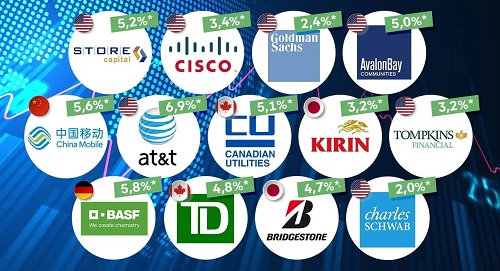If you ask a stockbroker why does a company pay dividends you will get an answer something like this. Companies use dividends to thank their shareholders for their support by sharing their profits in the form of dividends according to Fidelity. The rationale is that since investors like receiving dividends they will continue to invest in dividend stocks. This argument would seem to make sense for retired individuals who generally prefer stocks with low risk and a dividend check every quarter. Younger investors often do not want to receive dividends which are then taxed and prefer to see their stock appreciate more in value.
What Is a Dividend?
A dividend is part of the profits of a company. The board of directors votes to devote a portion of company profits each quarter. Dividends are paid per share of stock to owners of company stock on a specific date called the ex-dividend date. While investors only pay taxes on their stocks when they sell them, investors pay taxes on their dividends four times a year. While stocks held for more than a year are taxed at a lower tax rate, dividends are taxed at the same rate as ordinary income which is also how short term capital gains are taxed.
Are Dividend Stocks Good Investments?
Some mature companies have excellent cash flow. They can use their cash to buy other companies, do research to develop new products, put their money in the bank, or pay dividends. When a company can pay dividends, it is a sign of their financial health. And companies that have paid dividends for years and have increased those dividends over the years tend to appreciate in stock price as well. Thus, a mature company that pays dividends can be an excellent investment.
Dangers of Dividend Stocks
The are companies that pay dividends and fall on hard times. They continue paying the same dividend even as profits fall along with their stock price. They can look attractive because their dividend yield is higher than other stocks in the same sector. Investors need to be wary of such stocks and consider other factors beside a high dividend yield when investing. Assessing intrinsic stock value is important in this case. What sort of cash flow can you expect from the company going forward? In the case of a failing company the reason they are paying a high dividend is to fool investors who would otherwise sell their stock driving the share price lower and lower and the company out of business. But remember that not all companies with a good dividend yield are in trouble. Some simply make great profits and really do choose to reward shareholders who have been with them for years.
Who Pays Dividends and Who Does Not?
Investopedia looks at dividends and offers lists of dividend-paying and non-dividend-paying companies. Large companies in the dividend category include Suncor Energy, Exxon Mobil, Citigroup, Whirlpool Corp., Blackstone Inc., Wells Fargo & Co., Honda Motor Co., Pinnacle West Capital Corp., Microsoft, and Apple. Companies in the no-dividend category include Amazon, Alphabet, AutoZone, Meta, Biogen, VeriSign, Dish Network Corp., and CarMax. There are excellent investment opportunities in each category. Retirees who are not in a high tax bracket often choose dividend stocks for the cash flow because receiving a check every quarter is easier than cashing out a few shares of stock every three months.
Why Does a Company Pay Dividends? – SlideShare Version


